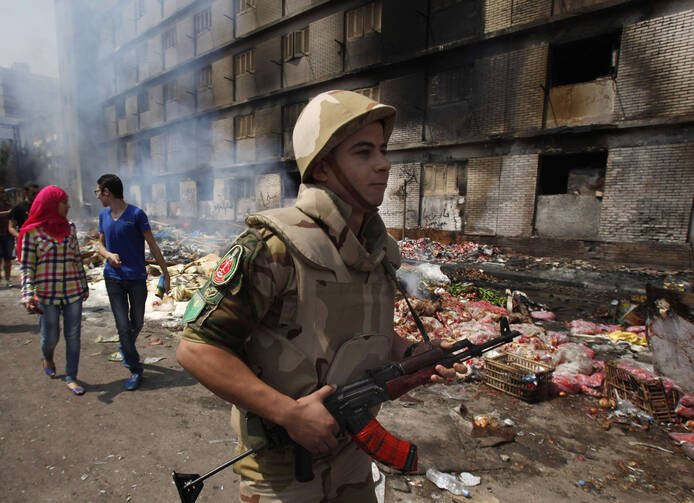A Coptic Catholic bishop who served as a member of the assembly that drafted Egypt's 2012 constitution said his country will not have a civil war, and foreign powers -- including the United Nations -- should not interfere.
In a wide-ranging interview with Arab West Report, Bishop Youhanna Golta of Alexandria, Egypt, also said people must view Egypt as a whole and not just be concerned about Coptic Christians. He discussed the history of Islam and asked for patience for Egyptian democracy, reminding people that European democracy took four centuries to evolve, and Egyptians have only had two or three years.
"Civil war is when a part of the country turns against the other part. This is not the case in Egypt," the bishop said Aug. 15, the day after more than 600 people were killed and several thousand injured after a police crackdown on people protesting the ouster of former President Mohammed Morsi.
"In Egypt, the people are united against a certain group that doesn't represent more than 2 percent of the country," he said, referring to extremists within the Muslim Brotherhood, to which Morsi belongs. "This cannot be called a civil war; these are called [acts of] terrorism.
"With respect to the burning of the churches, I said today in the Akhbar newspaper that 'burning of the churches makes us [Christians] proud, because we are contributing to the liberation of Egypt,'" said the bishop, who serves as an assistant to the Coptic Catholic patriarch.
Some Egyptian media published a list of all the Christian buildings and residences that had been burned in recent months. Church leaders condemned the attacks and, after the Aug. 14 violence, called off vigil services for the Aug. 15 feast of the Assumption.
Arab West Report is an online magazine dedicated to fostering greater understanding and tolerance between Arab and Western cultures. The interview with Bishop Golta was reprinted on the website of the Oasis Center, which Milan Cardinal Angelo Scola established to promote Christian-Muslim dialogue.
Most of Bishop Golta's interview with Arab West Report was conducted on Aug. 13 and, in it, the bishop called discrimination against Christians an "ideological and strategic mistake by extremist groups."
"There is no street or alley in Egypt that does not have both Muslims and Christians living together," he said. "It is impossible that Egypt gets divided. Egyptians are indivisible."
He said that, historically, Islam was "the only religion that did not plan on eliminating other people."
"Occupiers usually requested the occupied people convert their religions to those of their occupiers," he said. "Muslims did not do that. They [extremists] are deleting this icon in Islamic history."
The bishop rejected the term "Coptic issues," used to refer to issues that concern Egypt's Christians.
"We don't have Coptic issues, we have Egyptian issues," the bishop said. "That Copts are granted their rights while Muslims are deprived of them is not acceptable to me and indeed impossible to achieve. That the Copts undergo development while the Muslims live miserably is unacceptable and will not happen.
"We both rise and develop together or not. I am a believing Christian and I hope to die as a Christian, but Muslims face more injustice than Christians. The rate of poverty and unemployment among Muslims is higher than that the average rate. Here the view must be to Egypt as a whole and not to Copts only," he said.
He called for "separation of religion and state, but not separating religion from society."
"There is a difference. I am for having a state whose laws are civic laws, but we must also nourish society with the spirit of religion and ethics."
Responding to a question about whether a third party should facilitate dialogue among Egyptians, Bishop Golta responded, "Never! The (European Union) and U.S. should never intervene," then added the United Nations to his response.
"They have the money but not the rational or emotional capacity," he said. "The EU and the U.S. only care about their interests. We are an impoverished, humiliated, ignorant, marginalized, beastly people in their views.
"No third party should intervene," he repeated. "If we didn't know how to resolve our issues on our own, then we should not deserve to live."








